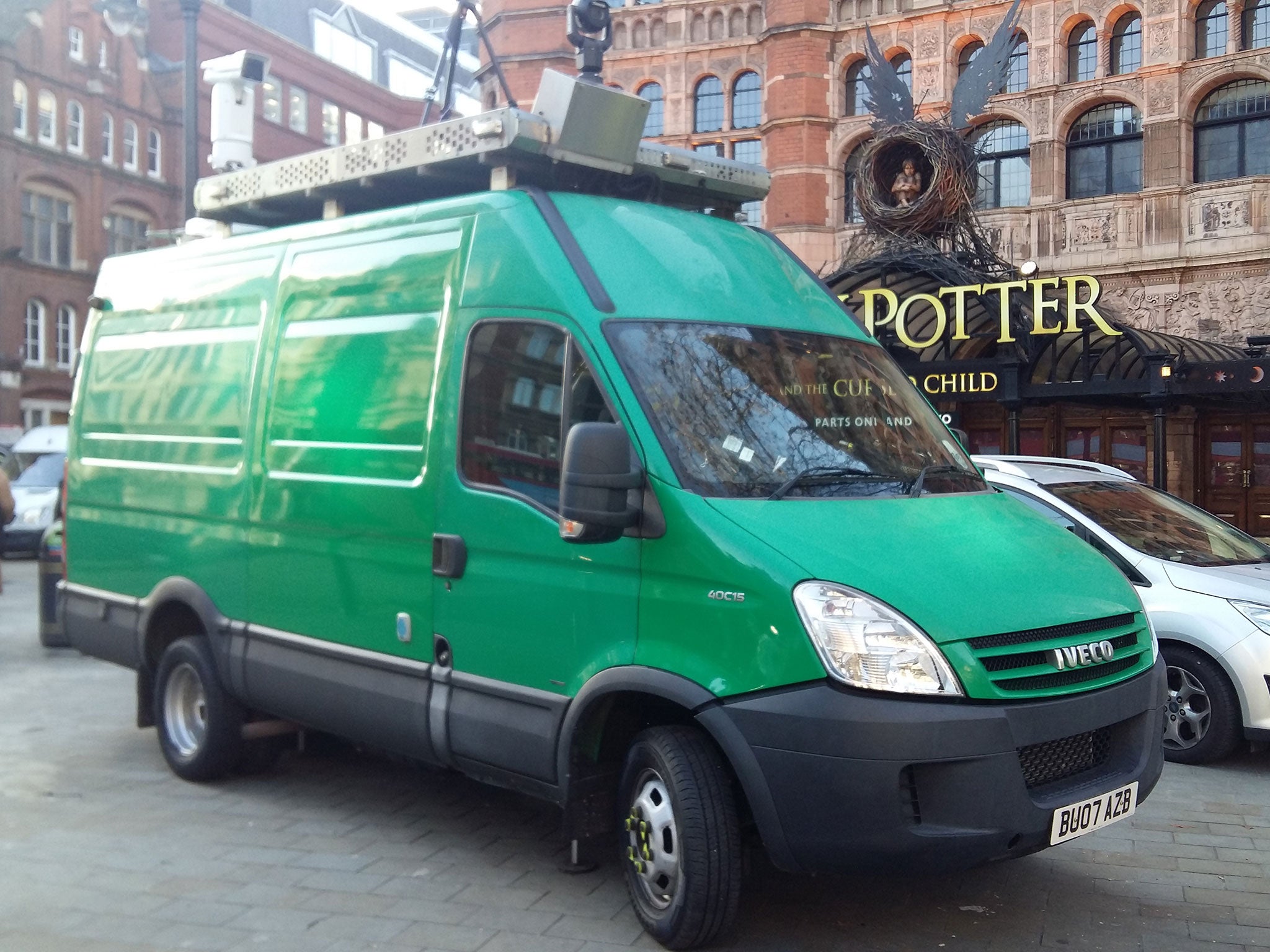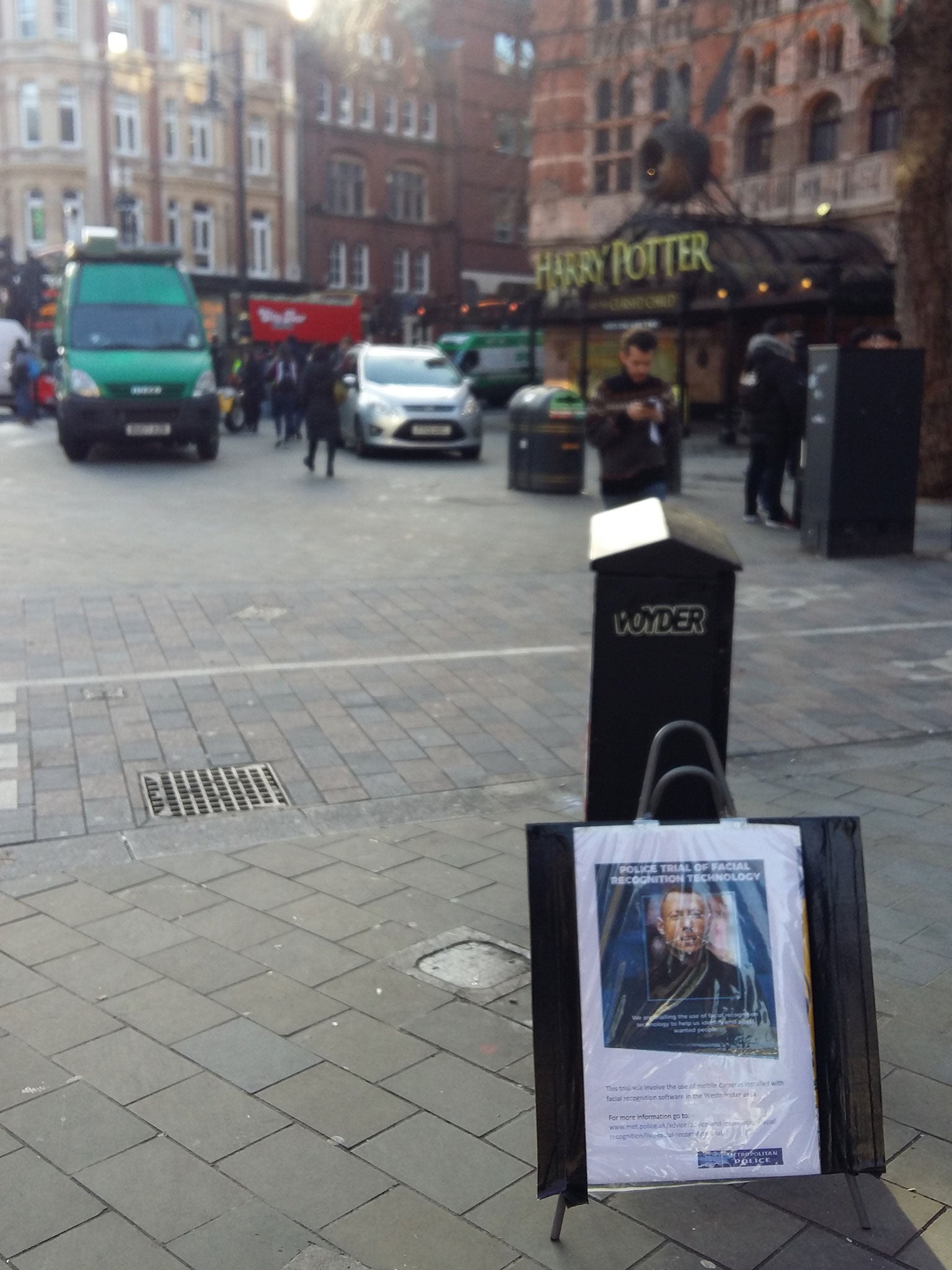Facial recognition cameras scanning unwitting tourists and Christmas shoppers in London's West End
Members of the public tell The Independent they did not realise they were scanned despite police pledge for 'overt' operation
Your support helps us to tell the story
From reproductive rights to climate change to Big Tech, The Independent is on the ground when the story is developing. Whether it's investigating the financials of Elon Musk's pro-Trump PAC or producing our latest documentary, 'The A Word', which shines a light on the American women fighting for reproductive rights, we know how important it is to parse out the facts from the messaging.
At such a critical moment in US history, we need reporters on the ground. Your donation allows us to keep sending journalists to speak to both sides of the story.
The Independent is trusted by Americans across the entire political spectrum. And unlike many other quality news outlets, we choose not to lock Americans out of our reporting and analysis with paywalls. We believe quality journalism should be available to everyone, paid for by those who can afford it.
Your support makes all the difference.Christmas shoppers and tourists in London’s West End are being scanned by controversial facial recognition technology that has been labelled “Orwellian” by critics.
The Metropolitan Police said its latest trial deployment would be “overt” and that members of the public would be informed by posters and leaflets.
But no one questioned by The Independent after they passed through a scanning zone in Cambridge Circus on Monday had seen police publicity material.
A 19-year-old student, who did not want to be named, said he was unhappy at being filmed without his knowledge but added: “I’m not a wanted criminal, so it doesn’t affect me.”
A 33-year-old tourist from the Netherlands said he had no idea he had been scanned.
He said he would be happy for facial recognition technology to be used for public safety “but not for other issues. It always starts with one thing and then it becomes another.”
Two knee-height signs saying facial recognition was in use were placed on pavements leading to the junction, as well as a small number of A4 posters on lampposts.
The filming was done from an unmarked green van with cameras mounted on top, with police checking any potential matches on the inside.
A small group of uniformed officers gave out leaflets on facial recognition on request and plain-clothed police were positioned in the surrounding area.

A Metropolitan Police press release ahead of the two-day deployment said: “The technology will be used overtly with a clear uniformed presence and information leaflets will be disseminated to the public. Posters with information about the technology will also be displayed in the area.”
It added: “Anyone who declines to be scanned during the deployment will not be viewed as suspicious by police officers. There must be additional information available to support such a view.”
But monitors from human rights groups said plain-clothed officers told them they had been told to consider stopping anyone who avoided the cameras.
Hannah Couchman, a policy and campaigns officer at Liberty, said officers told her that “people looking nervous and walking away, or covering their faces”, could be a trigger.
Silkie Carlo, the director of Big Brother Watch, said: “Some of the officers here have told us that if a person turns away from the van because they don’t want to be scanned, which is their right, that they will quite likely be stopped and potentially ID’d.
“It’s concerning that despite a legal challenge, public pressure and communications saying this will be overt, that they’ve done this in the most covert possible way.”
Ms Carlo said members of the public were unaware of the trial, and that police publicity materials were drowned out in an area of central London that is “overwhelmed with signs and advertisements”.
“The line between overt and covert policing is getting thin and that smacks of a step towards a more secretive and authoritarian style of policing,” she added.
“There is an unmarked van, plenty of plain-clothed police officers all over the streets … for all intents and purposes it looks like a covert deployment. People aren’t aware of what’s going on.”

Ms Couchman said the West End trial was “more covert” than previous deployments in Stratford, where The Independent also found people unaware that they were being scanned.
“It’s not a trial because people aren’t consenting to being involved,” she added. “It’s just a deployment of a technology that hasn’t been consented to, hasn’t been debated in parliament, there’s no law, there’s no framework. It’s an enormous risk to human rights.”
Both Big Brother Watch and Liberty are backing legal action against the use of live facial recognition in South Wales and London, amid concerns over human rights and the software’s accuracy.
The Metropolitan Police’s software was found to be returning “false positives” in more than 98 per cent of alerts earlier this year but the force has not released statistics on the current round of trials, which started in June.
Proponents of facial recognition argue that it can aid police officers finding wanted criminals and terrorists, particularly in busy public spaces and events.
For the West End trial, the Metropolitan Police used a list of 1,600 wanted people as part of ongoing efforts to reduce crime and tackling violence.
But the Metropolitan Police trials have not yet directly resulted in any arrests. One man was arrested on Monday morning after dealing drugs in front of a plain-clothed officer deployed for the operation.
A second man was flagged a potential match on the system but emerged to be a “false positive”.
Officers stopped him and when they suspected him of giving a fake name, a fingerprint test showed he was wanted separately. The Independent saw the man being arrested and taken away in a police van.
The Metropolitan Police said the arrest was not considered facial recognition-related as the suspect, a young black man, was not the same person brought up by the system initially.
Ms Carlo called the arrest “pure luck”, adding: “It was a positive outcome for the police operation but a failure for the facial recognition.”
The system scans live footage to send out alerts for potential matches between people on the street and a wanted database, which are then reviewed by officers on the ground.
They decide whether to stop people for further identity checks.
The leaflet handed out by police said live images are not stored and that only those flagged as a potential match with a wanted person will be retained.
The cameras were to run for eight hours on both Monday and Tuesday, moving around the Soho, Piccadilly Circus and Leicester Square areas.
Commander Ivan Balhatchet, Scotland Yard’s lead for facial recognition, said the trials will lead to a full evaluation of the technology.
“We continue to engage with many different stakeholders, some who actively challenge our use of this technology,” he added.
“In order to show transparency and continue constructive debate, we have invited individuals and groups with varying views on our use of facial recognition technology to this deployment.”

Join our commenting forum
Join thought-provoking conversations, follow other Independent readers and see their replies
Comments